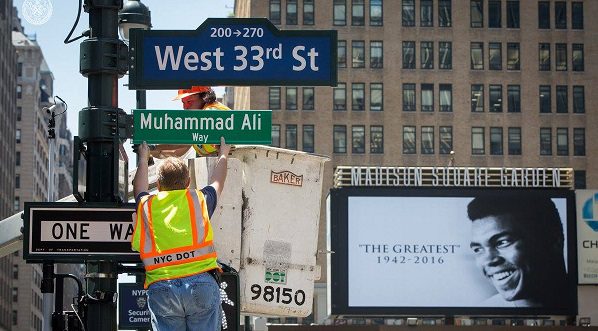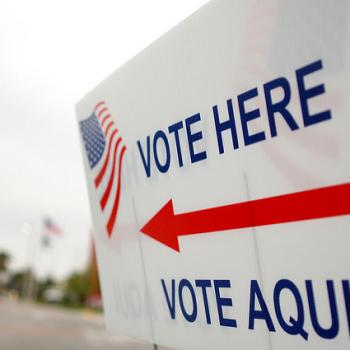
This is day nine of the #30Days30Writers 2016 Ramadan series – a double entry today. These are the remarks of Dr. Sherman A. Jackson made at the Janaza prayer of Muhammad Ali, the people’s champ, who made being a Muslim relevant, who recognized how important it was to put forth an inclusive Islam.
By Dr. Sherman A. Jackson
June 9, 2016, Louisville, KY — I would like to begin by extending my heartfelt condolences to the family of our beloved champion, Muhammad Ali.
For millions, indeed perhaps billions, of people across the world, of every race, of every religion, of every political persuasion and every nationality, the passing of Muhammad Ali has made us all feel a little more alone in the world. It has taken something away from the very sweetness of life itself, and it has brought us all a nagging sense of sadness.
Something solid, something big, something beautiful and life-affirming has left this world. And it is beyond the capacity of any of us to know if God will ever grace us with anything that even comes close to the majesty that was Muhammad Ali again.
But Ali was not only a public figure. He was a husband, a father, a son, a brother. And, if his passing has brought a certain emptiness to the lives of millions of people who never knew him personally, never felt the energy of his magical presence, never tasted the reassuring comfort of his loving embrace and never had to live with the weight and magnitude of his worries – if Ali’s passing could have this effect on the throngs of “distant lovers” across the world, I can hardly begin to imagine the depth of his family’s sense of loss.
So, to the family of our beloved champion, I would like to say, may Allah, may God Almighty, shower His blessings, His strength, His mercy and His compassion upon you all. May He provide you, as the days and the years wear on, with a solace that is so defiant in its depth and so tenacious in its grip that you know that it could only come from God. And may part of your solace come from the fact that you ultimately recognize that your sense of loss is only so great because God’s gift to you, in the person of Ali, was itself so singular and so magnificent.
But Ali was not only a gift to his family. He was a gift to his people, his religion, his country and ultimately to the world.
As for his people, Ali was unapologetic in his commitment to the plight of black people in America – and not just the “classes” among black folks but even more especially “the masses.” Ali was the “people’s champion,” and champion he did the cause of his people.
You see, the key to dominating a people is not simply to subject them to unjust laws, institutions and socio-cultural norms; the key is to get them to accept this as “normal,” as “just the way things are,” as “our way of life.” It is to get them to internalize the sense that their role in life is simply to live as others tell them to live, and to be thankful that those others are willing to allow them to live so. It is to take a people’s story away from them and then assign them some jive-time supporting role in your story. Once this happens, a people can never just “be themselves;” they must always “perform” according to what you say is normal; and they will be judged, awarded or penalized based on how well they follow your script.
In this state of mind, a dominated people remain convinced that “reality” is always fashioned by someone else, that they themselves can only function as consumers, never as producers of the fundamental values, conventions, ideas and institutions that shape life.
Ali took a wrecking ball to all of this. And, his brilliance and lasting endurance is that he touched us exactly where we needed to be touched: In our hearts and in the very deepest depths of our souls.
Ali gave us identity, a new, authentic way of being ourselves; he gave us pride and confidence; he taught us that we were beautiful and that what we thought was right or wrong was just as worthy of consideration as what others thought was right or wrong.
Ali inspired us; he filled us up. He gave us courage. And, he taught us something about how to fight, not only inside the ring but outside as well. For even in defeat, Ali showed the grace, humility and forward determination of a true champion.
This is the stuff that transformed the lives of millions of Black Americans, myself included. So many of us would never have achieved what we have been able to achieve were it not for the selfless sacrifice, the boundless courage and the love-filled inspiration of this great man.
As for his religion, there can be no doubt that at the very center of Ali’s being was Islam. Islam was both a source of his strength and the sustainer of his sense of mission. About this there simply can be no doubt.
But beyond what Islam did for him, Ali did something for Islam, especially in America. Ali did more to normalize Islam in America than perhaps any other Muslim in this history of this country.
Of course, Ali was not a theologian, a shaykh or an Imām. And because of this, some might think that I am overstating my case here.
But here’s a news flash: most people do not live in the world of the theologians or the scholars. Most people live in the world of culture. And while religious scholars play a critical role in preserving the proper understanding of religion, if the prevailing culture doesn’t reinforce and give practical meaning to their teachings, those teachings will find limited application among the masses.
It is one thing to teach people that God wants them to be charitable to the poor or does not want them to eat pork. It is another thing to produce a “cultural orthodoxy” that makes generosity cool and eating pork “un-cool.” The same applies to standing up for what is right and standing against what is wrong.
As a cultural icon, Ali made being Muslim cool. Ali made being Muslim dignified. Ali made being Muslim relevant. And all of this he did in a way that no one could challenge his belongingness to or in this country. Ali put the question of whether a person can be a Muslim and an American to rest. Indeed, he KO’d that question. With his passing, let us hope that that question will now be interred with his precious remains.
As for his country, there is a hadith, a statement of the Prophet Muhammad, in which he instructs the Muslims:
“Help your brother, whether he is right or wrong. His companions asked him, “O Messenger of God, we understand that we must help our brother when he is right, but how can we help him when he is wrong?” The Prophet responded, “Stop him from doing the wrong he does.”
Ali helped this country move closer to its own ideals. He helped America do and see some things that America was not quite ready to do or see on its own. And, because of Ali’s heroic efforts, America is a better place today for all of us. In this regard, Ali belongs not just to the Muslims but to all. Whether you are black, white, Asian or Latino, Jewish, Christian, Muslim or atheist, if you are an American, Ali is part of your history, part of what makes you who you are.
Thus, as an American, Ali belongs to you too, and you should be proud of this precious piece of your American heritage and never allow anyone to deny you or disabuse you of your rightful claim to Ali’s legacy
As for the world, who has filled the world with more hope, more inspiration, more empathy, more humility and more good will than Muhammad Ali? Till the end, after all he had gone through in his life – despite his debilitating illness and all the other reasons he could have relied upon to be angry, vindictive and insensitive to the sufferings of others – after all of this, there was in Ali no hatred, no bitterness, no malice. There was nothing but a bigness of heart, a graciousness of spirit and good will towards everyone!
What a gift!!!
As I close, I would like to say something for the record; and I would like to say it to Muhammad Ali himself:
Ali, I love you, man. And I have loved you for a very long time. And I will continue to love you, to cherish your memory and to celebrate your legacy. And this I will do, God willing, for as long as I shall remain on this planet.
For now, however, I must bid you farewell. So, I say to you, so long, my illustrious champion, my ever-present inspiration, my hero, my Muslim brother: May God’s peace and blessings caress you and comfort you until that time that you meet Him. Until then, my beloved, rest, rest in peace.
And know, as I now know, the true meaning of those Prophetic, indeed those divine words, Salām alaykum.
Dr. Sherman Jackson is the director of the King Faisal Chair in Islamic Thought and Culture and a professor of Religion and American Studies and Ethnicity at the University of Southern California.











